Unit 7 Nobody wins (Ⅱ Period 1 Grammar 方位介词&不定代词(共40张PPT)2023-2024学年八年级英语上册同步精品课堂(牛津上海版)
文档属性
| 名称 | Unit 7 Nobody wins (Ⅱ Period 1 Grammar 方位介词&不定代词(共40张PPT)2023-2024学年八年级英语上册同步精品课堂(牛津上海版) |
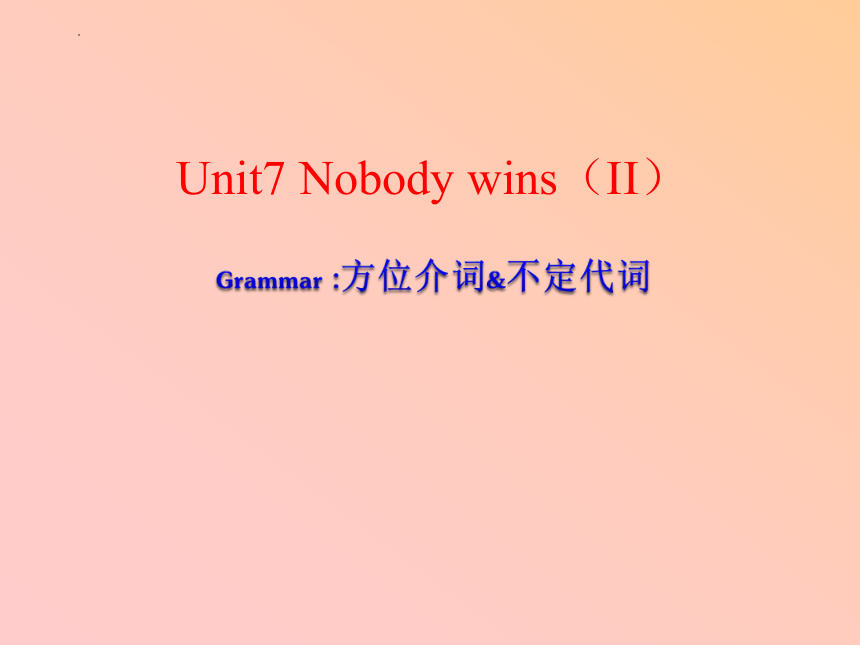
|
|
| 格式 | pptx | ||
| 文件大小 | 793.3KB | ||
| 资源类型 | 教案 | ||
| 版本资源 | 牛津上海版(试用本) | ||
| 科目 | 英语 | ||
| 更新时间 | 2023-11-21 16:59:52 | ||
图片预览




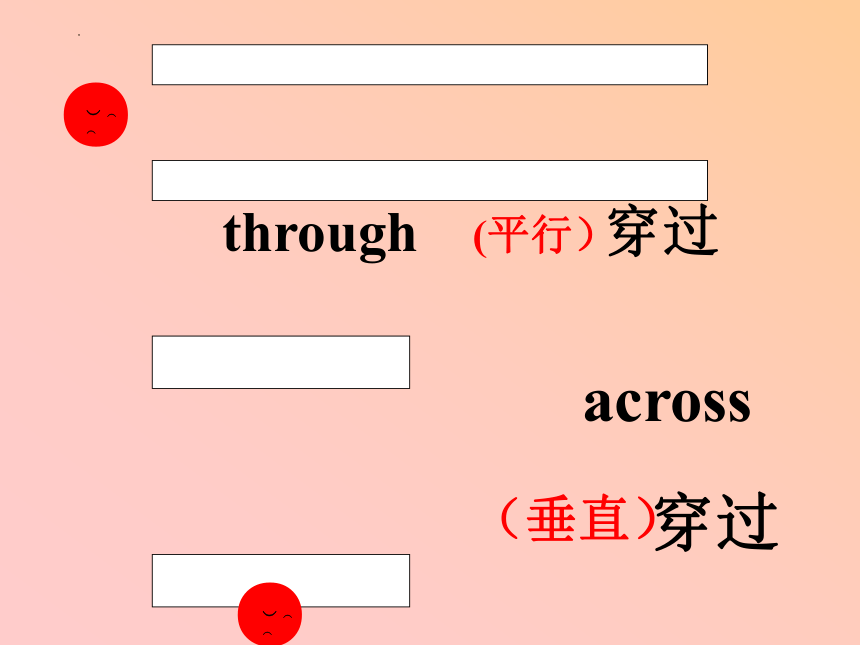
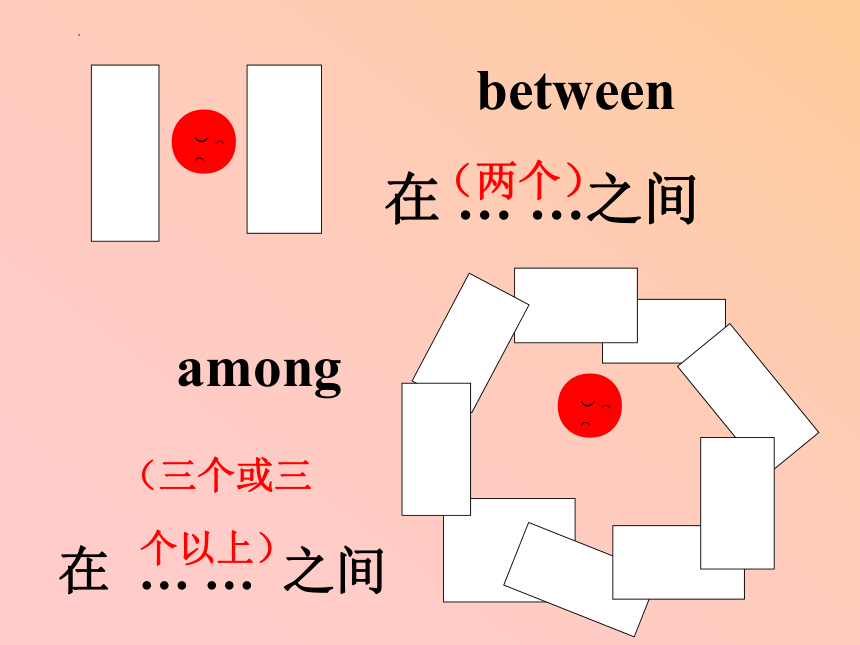
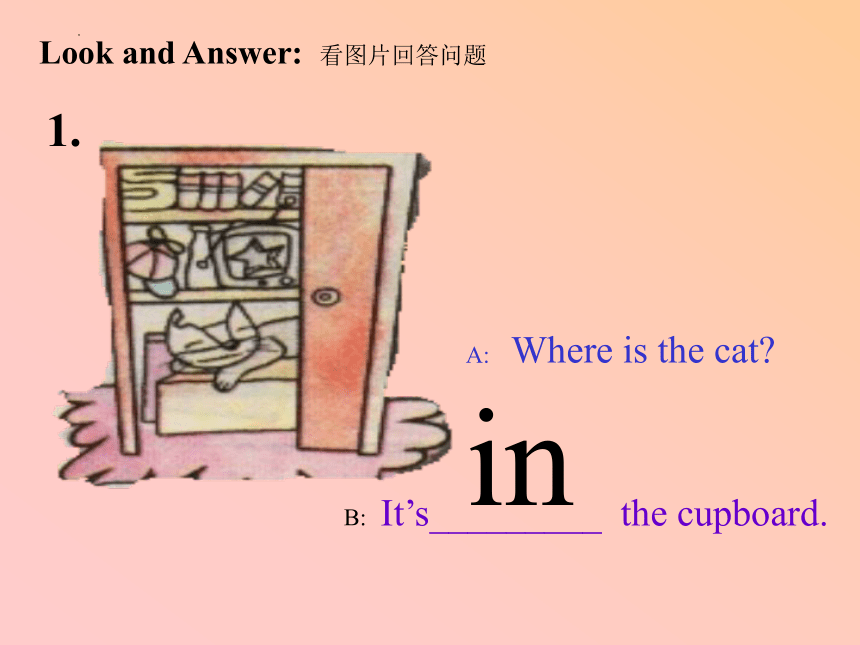

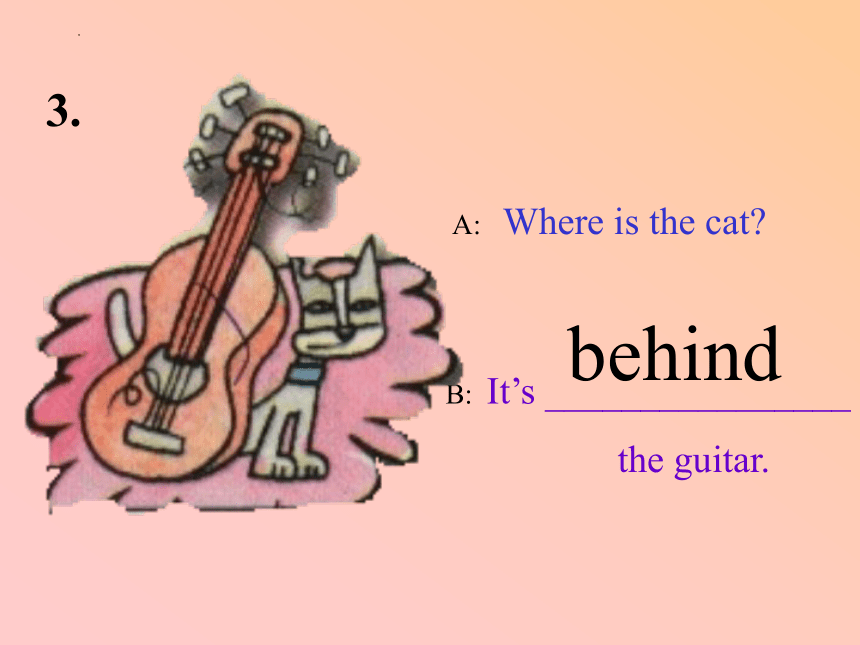
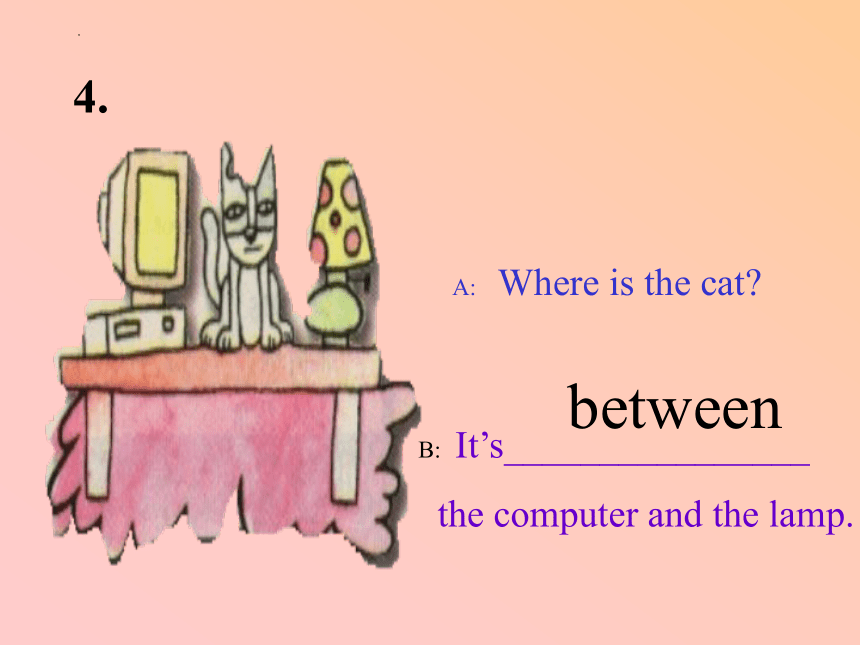


文档简介
(共40张PPT)
Unit7 Nobody wins(II)
Grammar :方位介词&不定代词
方位介词
●
( )(
in
在… …里面
under
在… …下面
in front of
在… …前面
beside
在… …旁边
behind
在… …后面
●
( )(
●
( )(
●
( )(
●
( )(
Quick Response: 看图说出图片所表示介词
on
在… …上面
●
( )(
●
( )(
above
在 … …上方
两者表面接触
两者表面不接触
●
( )(
●
( )(
through 穿过
(平行)
across
穿过
(垂直)
●
( )(
●
( )(
between
在 … …之间
(两个)
among
在 … … 之间
(三个或三
个以上)
A: Where is the cat
B: It’s_________ the cupboard.
in
Look and Answer: 看图片回答问题
1.
A: Where is the cat
B: It’s______________ the table.
under
2.
A: Where is the cat
B: It’s ________________
the guitar.
behind
3.
A: Where is the cat
B: It’s________________
the computer and the lamp.
between
4.
A: Where is the light
above
B: It’s_______________
the doctor.
5.
A: Where is the train
B: It’s running _________
the tunnel.
through
6.
A: Where is the table
B: It’s _________
the people.
among
The table is in the center
7.
Jack
Mr. Green
Ben
Mrs. White
north 北
south 南
west
西
center 中心
is north of the table.
is south of the table.
is west of the table.
is east of the table.
east
东
south 南
east 东
西 west
north 北
north-east
东北
center
south-west
西南
north-west
西北
south-east
东南
Flower Street
Water Street
Post Office
Cinema
Hotel
Police Station
Park
School
Bank
Shopping Center
Underground Station
A: Where is the post office
B: It’s north of the park
N
E
some&any
some & any 的不同
some
any
some一些,某些,某种,某一个
some+可数名词单数:某一:some day;
some+可数名词复数:一些,几个:some books;
some+不可数名词:一些: some water
意为“任何,任何的”
多用于肯定句
多用于否定句、疑问句
Example:
There are some boats on the river.
I can’t see any tea. (我没看见茶叶。)
Do you have any friends at school (你在学校有些朋友吗 )
some & any 的不同
some
any
some一些,某些,某种,某一个
some+可数名词单数:某一:some day;
some+可数名词复数:一些,几个:some books;
some+不可数名词:一些: some water
意为“任何,任何的”
多用于肯定句
多用于否定句、疑问句
在表示建议,反问,请求的疑问句中,或期望得到肯定回答时,多用some而不用any。
Example:
Can I have some water 我可以…吗?
What about some water …怎么样?
Would you like some water 你想要…吗?
some & any 的不同
some
any
some一些,某些,某种,某一个
some+可数名词单数:某一:some day;
some+可数名词复数:一些,几个:some books;
some+不可数名词:一些: some water
意为“任何,任何的”
多用于肯定句
多用于否定句、疑问句
在表示建议,反问,请求的疑问句中,或期望得到肯定回答时,多用some而不用any。
当any表示“任何”的意义,起强调作用时,它可以用在肯定句中。
Example:
Any student can read the passage.
复合不定代词
定义
复合不定代词是由some-,any-,no-,every-加上-one,-body,
-thing,-time所组成的不定代词。
这些词在句中的作用相当于名词
1. 不定代词some- ,常用于肯定句中(掌握)
Our teacher will have something important to tell us.老师有重要的事情要告诉我们。
2、也可用于带有感彩(请求或提建议)或希望对方做出肯定答复的疑问句,以及表否定的疑问句(了解)
Will you please bring something to the party 请你带东西参加聚会好吗?
Don't you have something to say 难道你没有什么要说的吗?
知识点一
1、不定代词any-,常用于否定句、疑问句中
He didn't have anything for breakfast.
ls there anything wrong with the car
2、any-不定代词也可用于肯定句中,表示任何人/事
I can do anything for you.
2、复合不定代词在句中作主语时,
谓语动词用单数形式
Nobody knows the truth.
没人知道真相。
Something is wrong with my car.
我的车坏了。
知识点二
3、不定代词被形容词修饰时,形容词后置
不定代词+adj / to do / 介词短语
(1) I can tell you something important in today's newspaper.
(2)There is something wrong with his left eye.
(3)Would you like something cold to drink 你要喝凉的东西吗?
(4)Everyone in my family likes shopping.我家人人喜欢购物。
知识点三
4、复合不定代词的否定句
1.全部否定 句中含有nothing, nobody,no one和not anything,not anybody, not anyone的是全部否定句。
They heard nothing.
=They didn't hear anything.
他们什么都没听见。
知识点四
2.部分否定 句中含有not everything, not everyone, not everybody,意思是“不都,并非都”,是部分否定句。
Not everybody likes hiking.
不是每个人都喜欢远足。
The film won't interest everyone.
这部电影不会让每一个人都感兴趣的。
Using
1.His father works hard _________ the construction site every day.
A.on B.at C.in D.by
2.The weather ________ Beijing is pretty good in autumn.
A.on B.at C.in D.for
3.How poor the old man is! Let’s do ________ to raise money for him.
A.nothing B.something C.everything D.anything
4.Japan is_________ the east of our country.
A.to B.in C.on D.of
5.—Where is Marry flying
—She is flying to France soon. She will arrive ________ Paris ________ the morning of July 2.
A.to; on B.at; on C.in; in D.in; on
6.I was born in Harbin, an ice city ________ the north of China.
A.from B.to C.on D.in
7.I feel afraid when I go ________ the forest alone at night.
A.through B.over C.against D.across
8.You’ll find a refrigerator ________ of the room and there’s a window ________ it.
A.in right; on B.on the right; under
C.in left; next to D.on the left; above
9.—When and where was the pop star born
—She was born __________ August 5th, 1985 __________ New York.
A.on; on B.in; in C.on; in D.in; on
10.Don’t stand ________ the window. It’s too dangerous.
A.against B.with C.along D.in
Keys
1.A
【详解】句意:他的父亲每天在工地上辛勤工作。
考查介词辨析。on在……上;at在;in在……里面;by借助。根据“the construction site”可知,是在工地上,用介词on。故选A。
2.C
【详解】句意:北京秋天的天气很好。
考查介词辨析。on在……上;at在(某处),后面加小地点;in在……里,后面加大地点;for为了。空格后为城市“Beijing”,大地点,故应用介词in。故选C。
3.B
【详解】句意:这个老人多么可怜呀!让我们做一些事为他筹款吧。
考查代词辨析。nothing没有什么;something一些事,通常用在肯定句;everything一切;anything一些事,通常用在否定句和疑问句。根据“How poor the old man is”和“to raise money for him”且句子为肯定句可知,应是为筹款做一些事,故选B。
4.A
【详解】句意:日本在我们国家的东部。
考查方位介词。to指的是一个范围和另一个范围之间隔断距离,表示“在某范围之外”;in表示在某范围内;on指的是一个范围紧挨着另一个范围,表示“两者相接壤”;of的,一般加名词。根据Japan“日本”和 our country可知,Japan在中国东部范围外,两者之间隔断距离,所以用to。故选A。
5.D
【详解】句意:——玛丽乘飞机要去哪里?——她很快就要飞往法国了。她将于7月2日上午到达巴黎。
考查介词辨析。arrive in后接大地点;arrive at后接小地点。“Paris”是大地点,第一空用in,排除AB。in后接年、月、季节等;on后接具体某一天或具体某一天的早上、下午、晚上等。根据“the morning of July 2”可知此处指7月2日的早上,用介词on。故选D。
6.D
【详解】句意:我出生在哈尔滨,一个中国北方的冰城。
考查介词辨析。from从;to与某地相隔;on与某地相邻;in在某个范围内。根据“I was born in Harbin, an ice city...the north of China.”及常识可知,哈尔滨在中国范围内。故选D。
7.A
【详解】句意:当我晚上独自一人穿过森林时,我感到害怕。
考查介词辨析。through从内部穿过;over从上方穿过;against依靠,对抗;across从表面穿过。根据空后名词forest“森林”可知,此处是穿过森林,从森林内部穿过,用through。故选A。
8.D
【详解】句意:你会发现房间左边有一个冰箱,上面有一个窗户。
考查介词辨析。in right没有这种写法;on在……上,表示将某物放、扔或抛落至表面;on the right of在……的右边;under就是一般的下方;in left没有这种写法;next to紧邻;on the left of在……的左边;above正上方。结合选项分析可知,第一个空的A/C选项不对;根据“there’s a window…it.”可知,窗户应该在冰箱的上方,因此用above;on the left of the room 意为“在房间的左边”。故选D。
9.C
【详解】句意:——这位流行歌星是何时何地出生的?——她于1985年8月5日出生于纽约。
考查介词辨析。on在(具体的某一天); in在(某个较大地点)。“August 5th”为具体的某一天,用on;“New York”是个较大的地点,用in。故选C。
10.A
【详解】句意:不要靠着窗户。太危险了。
考查介词。against倚,紧靠;with和;along沿着;in在……里。根据语境可知是靠着窗户,应是against。故选A。
Using
11.—There are many theatres ________ the island.
—Yes. Broadway is ________ the southern end of the island.
A.at; in B.on; on C.at; on D.on; at
12.Tianjin is a beautiful city ________ the north ________ China.
A.in; in B.on; of C.at; in D.in; of
13.________ the morning of October 1st, many visitors arrived ________ the train station for a trip.
A.In; at B.On; to C.In; in D.On; at
14.Shandong is ________ the south of Hebei.
A.in B.on C.to D.at
15.There is a grocery store just ________ our home. You can see it easily.
A.across from B.to C.on D.through
16.—Can I have ________
—Of course you can. Here you are.
A.anything eat B.something eating C.anything to eat D.something to eat
17.—Which would you like better for breakfast Bread or cake
—Oh, I like ________. I just want some noodles.
A.both B.neither C.either D.all
18.Each of us has ________ life goals. They will guide us to a bright future.
A.a little B.few C.a few D.little
19.—Is there ________ you’d like to share with us about this kind of disease
—Yes, we feel __________ to see it can be cured.
A.something else; lucky enough B.anything else; lucky enough
C.else anything; enough lucky D.else something; enough lucky
20.Some students join in the English corner, ________ go to different clubs.
A.other B.the others
C.other students D.another student
Keys
11.D
【详解】句意:——岛上有许多剧院。——是的,百老汇在岛的南端。
考查介词辨析。on在上面;at在;in在里面。在某个岛屿上要用介词on。at the end of“在……的尽头”,故选D。
12.D
【详解】句意:天津是中国北方一个美丽的城市。
考查介词辨析。表示方位介词:in在某个范围内;on与某地接壤;at后接小地点。of……的。天津在中国境内,所以此处用in the north of表示“在……的北部”,故选D。
13.D
【详解】句意:10月1日上午,许多游客为了旅行来到了火车站。
考查介词辨析。in后接年、月等范围较大的时间,或后接范围较大的地点;on后接具体的某一天的早、中、晚;to给、到;at后接范围较小的地点。“the morning of October 1st”指具体的某一天的早晨,故第一空用“On”;“the train station”属于范围较小的地点,故第二空用“at”。故选D。
14.B
【详解】句意:山东在河北的南面。
考查介词辨析。in在里面(包含);on在(接壤);to在(相隔);at在。根据“Shandong is...the south of Hebei.”和常识可知,山东与河北相邻,是接壤的,故选B。
15.A
【详解】句意:我们家对面就有一家杂货店。你可以很容易地看到它。
考查介词短语。across from对面;to到;on在上面;through通过。根据“There is a grocery store just...our home.”可知,杂货店在家的对面。故选A。
16.D
【详解】句意:——我能吃点什么吗?——你当然可以。给你。
考查代词辨析和非谓语动词。something“某物,某事”,主要用于肯定句中,也可用于疑问句中表示一种较肯定的意味或提出申请等;anything“某事”、“某东西”,主要用于否定句,疑问句,用以代替something。根据“Can I have...”和选项可知,此处表示提出申请,应在疑问句中用something,排除A和C;“eat”是未发生的动作,且空处位于被修饰词后,应用动词不定式to eat作定语。故选D。
17.B
【详解】句意:——早餐你更喜欢哪一种?面包还是蛋糕?——我都不喜欢。我只想要一些面条。
考查代词。both两者都;neither两者都不;either两者中的任意一个;all全部。根据“I just want some noodles.”可知面包和蛋糕都不想要,应用neither,故选B。
18.C
【详解】句意:我们每个人都有一些人生目标。它们将引导我们走向光明的未来。
考查不定代词辨析。a little一些,后接不可数名词;few几乎没有,后接可数名词复数;a few一些,后接可数名词复数;little几乎没有,后接不可数名词。由“Each of us has…life goals”可知,接的是可数名词复数而且是肯定句。故选C。
19.B
【详解】句意:——关于这种疾病,你还有什么想和我们分享的吗?——是的,我们很幸运看到它可以治愈。
考查形容词修饰不定代词以及副词的位置。something一些东西,用于肯定句和表示建议、请求的疑问句;anything任何东西,用于否定句和疑问句。第一空为疑问句,且形容西修饰不定代词要后置,所以第一空应该anything else;enough“足够”,修饰形容词时位于形容词之后,故选B。
20.C
【详解】句意:一些学生参加英语角,另一些学生去不同的俱乐部。
考查代词辨析。other其他的,后加名词;the others其他人或物,表特指;other students其他学生,泛指;another student另一个学生。根据“Some students...”可知此处泛指其他的学生,用other students。故选C。
Using
21.Is there ________ I can do for you
A.something important B.important something
C.important anything D.anything important
22.I’ll go to the bank this morning. There’s very ________ money left.
A.little B.a little C.few D.a few
23.My parents gave me two birthday gifts. One was a book I like, and ________ gift was a trip to Sanya.
A.the other B.other C.others D.another
24.—Is ________ ready for the school sports meeting
—No. We still have ________ to do.
A.anything; something B.everything; something
C.anything; nothing D.everything; nothing
25.—What are you going to do during the summer holidays
—________. I will just stay at home.
A.Nothing special B.Something special C.Special nothing D.Special something
26.Can __________ answer this difficult question
A.anyone else B.someone else C.else anyone D.else someone
27.—Was there _______ about the 19th Asian Games in Hangzhou
—Yes. I think the most special thing must be the creative and meaningful background music! It made it possible that people around the world can feel the culture in music of China.
A.anything special B.special anything C.something special D.special something
28.—Did you buy ________ special
—No, I bought ________.
A.something; nothing B.anything; nothing C.anything; something D.nothing; something
29.— ________ is going to see a movie with us
— Nobody.
A.What else B.Who else C.Who others D.Who other
30.I have two skirts. One is red, and ________ is blue.
A.other B.others C.the other D.another
Keys
21.D
【详解】句意:有什么重要的事需要我帮忙吗?
考查复合不定代词用法。something某事,常用于肯定句中; anything任何事情,常用于否定句或者疑问句中;当形容词修饰不定代词时,形容词要放在不定代词的后面,排除B、C两项;句子为一般疑问句,此处选anything important。故选D。
22.A
【详解】句意:我今天早上将会去银行。剩下的钱很少了。
考查代词辨析。little几乎没有,修饰不可数名词;a little一点,修饰不可数名词;few几乎没有,修饰可数名词复数;a few几个,修饰可数名词复数。根据“I’ll go to the bank this morning”可知因为钱不多了,所以要去银行取钱,修饰不可数名词用little。故选A。
23.A
【详解】句意:我父母给了我两件生日礼物。一份是我喜欢的书,另一份礼物是三亚之旅。
考查代词辨析。the other两者中的另一个;other其他的,后接复数名词;others其他的人或物;another另一个(三者或三者以上)。根据“two birthday gifts”及“One”可知,此处指两者中的另一个,故选A。
24.B
【详解】句意:——学校运动会的一切都准备好了吗?——没有。我们还有事情要做。
考查不定代词辨析。anything任何事;something某事;everything一切,所有事;nothing没有什么。根据“ready for the school sports meeting”可知,此处是在询问是否与学校运动会相关的一切都准备好了,应用everything,排除选项A和C;根据“No. We still have...to do”可知,还有事情要做,此处为肯定句,应用something。故选B。
25.A
【详解】句意:——暑假期间你打算做什么?——没什么特别的。我就待在家里。
考查复合不定代词。nothing没有什么;something一些事情。复合不定代词与形容词搭配时,形容词需要后置,故排除C、D两项;由“I will just stay at home.”可知,是没什么特别的,所以待在家。故选A。
26.A
【详解】句意:还有人能回答这个难题吗?
考查不定代词和形容词后置。someone某人,常用于肯定句中;anyone任何人,常用于否定句或者疑问句中;else其他的。根据“Can ... answer this difficult question ”可知,本句是疑问句,用anyone;形容词修饰不定代词时,形容词要放在不定代词后面。故选A。
27.A
【详解】句意:——杭州第十九届亚运会有什么特别的地方吗?——是的。我认为最特别的一定是富有创意和意义的背景音乐!它使世界各地的人们能够感受到中国音乐的文化。
考查代词辨析以及定语后置。anything任何事,常用于否定句和疑问句中;something一些事,常用于肯定句中。句子是一般疑问句,用anything,排除CD;形容词修饰复合不定代词时,形容词要后置,排除B。故选A。
28.B
【详解】句意:——你买些特殊的东西了吗?——不,我什么都没买。
考查不定代词。anything任何事;something某物;nothing没什么。根据第一空是问句,所以将something变为anything,由于No,所以表示否定,是nothing。故选B。
29.B
【详解】句意:——还有谁将和我们一起看电影?——没有人。
考查词义辨析。what什么;who谁;else形容词,其它的,用在疑问词后面修饰疑问词;others代词,其它的;other形容词,其它的,用在名词前作定语。根据“Nobody”可知此处疑问词应用who;而由“who”为疑问词可知此处应用else修饰,故选B。
30.C
【详解】句意:我有两条裙子。一条是红色的,另一条是蓝色的。
考查词义辨析。other别的,其他的,形容词;others其他,代词;the other(两个中的)另一个;another(同类中的)又一个,再一个。one…the other…意为“一个…另一个…”,固定短语。故选C。
Using
31.China is ________ the west of Japan and ________ the east of Asia (亚洲).
A.to; on B.on; on C.to; in D.on; in
32.Tomorrow is Mother’s Day. I want to give my mother ________.
A.something special B.special something C.anything special D.special anything
33.David is too shy to make friends. He often plays alone. He has ________ friends.
A.a little B.a few C.little D.few
34.—Do you find ________ during your trip
—Of course. I’ll tell you later.
A.nothing enjoyable B.anything enjoyable C.enjoyable nothing D.enjoyable anything
35.This dress is a bit dirty, would you please change __________ one for me
A.others B.the other C.the others D.another
36.The girl sat ______ me, so I could see the sadness on her face directly.
A.behind B.between C.outside D.opposite
37.— Where is Liaoning
— It’s ________ the northeast of China and lies ________ the southeast of Jilin.
A.on;to B.in;to C.in;on D.on;on
38.Connie arrived ________ the village ________ a snowy night.
A.at; on B.at; in C.in; at D.in; on
39.We went ________ a busy road and arrived at a supermarket.
A.through B.across C.over D.by
40.My school is ______ our city.
A.to the east of B.at the east of C.in the east of D.on the east of
Keys
31.C
【详解】句意:中国在日本的西部亚洲的东部。
考查方位介词。“to”指的是一个范围和另一个范围之间隔断距离,表示“在某范围之外”,“in”表示在某范围内,“on”指的是一个范围紧挨着另一个范围,表示“两者相接壤”。本题中,中国在日本的西边,在范围之外,用介词“to”,且中国在亚洲的东边,在亚洲范围内,用介词“in”。故选C。
32.A
【详解】句意:明天是妇女节。我想给我妈妈一些特殊的东西。
查复合不定代词。复合不定代词与形容词连用时,形容词要作后置定语,故排除B、D;something special特别的东西,特别的事情;anything special什么特别的东西或事情。something一般用于肯定句中,anything一般用于否定句或疑问句中,此句为肯定句,应用something。故选A。
33.D
【详解】句意:大卫太害羞了,交不到朋友。他经常一个人玩。他几乎没有朋友。
考查代词辨析。a little一些,表示肯定意义;a few一些,表示肯定意义;little很少,表示否定意义;few很少,表示否定意义。little修饰不可数名词,few修饰可数名词。空后的friends是可数名词,用few或a few修饰,根据“ David is too shy to make friends. He often plays alone.”可知他朋友少,此处表示否定意义。故选D。
34.B
【详解】句意:——你在旅行中发现了什么令人愉快的事吗?——当然。我以后会告诉你的。
考查不定代词。nothing没什么;anything任何事;当形容词修饰不定代词时,位于不定代词的后面,排除CD两项。根据“I’ll tell you later.”可知,此处询问是否有一些令人愉快的事,因此用代词anything,故选B。
35.D
【详解】句意:这件衣服有点脏,你能再给我换一件吗?
考查代词辨析。others其他的人或物;the other(两者中)另一个;another(表示三者或三者以上)另一个;the others剩余所有的人或物。根据语境可知,本句中没有说只有两件衣服,所以应是表示同类事物中三者或三者以上中的另一个。故选D。
36.D
【详解】句意:女孩坐在我对面,我可以直接看到她脸上的悲伤。
A. behind在…后面;B. between在…之间;C. outside在外面; D. opposite对面的。从I could see the sadness on her face directly,可知,这个小女孩应该是坐在我的对面,这里用opposite。故选D。
37.C
【详解】句意:——辽宁在哪里? ——它在中国的东北部,位于吉林的东南部。
考查介词。on表示两地是相邻接壤的关系;to表示在某一地区外部的方位,不属于该范围的且不接壤的;in表示在某一地区内的某方位,属于该范围的。根据常识可知,辽宁在中国的版图范围内,故第一空应用介词in,A、D选项可排除。辽宁与吉林接壤,故第二空应用介词on,故选C。
38.A
【详解】句意:Connie在一个下雪的晚上到达了这个村庄。
考查介词辨析。at 用作地点介词时,意为“在(某处)”,后接小地点;用作时间介词时,意为“在(某时间或时刻)”,后接时刻点。in 用作地点介词时,意为“在(某处)”,后接大地点;用作时间介词时,意为 “在(某时间)内”,后接上午、下午、晚上或表示月、季、年、世纪等较长的时间;on用作方位介词时,意为“在……上”;用作时间介词时,意为“在(某一天) ”,后接具体某天的上午、下午、晚上或具体日期、节假日、星期等。本题中 “the village”为小地点,第一个空应填地点介词at;“a snowy night”为具体的某个晚上,第二个空应填时间介词on。故选A。
39.B
【详解】句意:我们穿过一条繁忙的马路,到达超市。
考查介词辨析。through穿过(物体内部);across穿过,横穿;over在……上方;by通过。根据空格后的“a busy road”可知此处表示“过马路”,应用介词across。故选B。
40.C
【详解】句意:我的学校在我们城市的东部。
考查方位介词。east东边,in表示在内部;on表示接壤;to表示隔空相望。我的学校应该是在我们城市之内,故选C。
see you again
Unit7 Nobody wins(II)
Grammar :方位介词&不定代词
方位介词
●
( )(
in
在… …里面
under
在… …下面
in front of
在… …前面
beside
在… …旁边
behind
在… …后面
●
( )(
●
( )(
●
( )(
●
( )(
Quick Response: 看图说出图片所表示介词
on
在… …上面
●
( )(
●
( )(
above
在 … …上方
两者表面接触
两者表面不接触
●
( )(
●
( )(
through 穿过
(平行)
across
穿过
(垂直)
●
( )(
●
( )(
between
在 … …之间
(两个)
among
在 … … 之间
(三个或三
个以上)
A: Where is the cat
B: It’s_________ the cupboard.
in
Look and Answer: 看图片回答问题
1.
A: Where is the cat
B: It’s______________ the table.
under
2.
A: Where is the cat
B: It’s ________________
the guitar.
behind
3.
A: Where is the cat
B: It’s________________
the computer and the lamp.
between
4.
A: Where is the light
above
B: It’s_______________
the doctor.
5.
A: Where is the train
B: It’s running _________
the tunnel.
through
6.
A: Where is the table
B: It’s _________
the people.
among
The table is in the center
7.
Jack
Mr. Green
Ben
Mrs. White
north 北
south 南
west
西
center 中心
is north of the table.
is south of the table.
is west of the table.
is east of the table.
east
东
south 南
east 东
西 west
north 北
north-east
东北
center
south-west
西南
north-west
西北
south-east
东南
Flower Street
Water Street
Post Office
Cinema
Hotel
Police Station
Park
School
Bank
Shopping Center
Underground Station
A: Where is the post office
B: It’s north of the park
N
E
some&any
some & any 的不同
some
any
some一些,某些,某种,某一个
some+可数名词单数:某一:some day;
some+可数名词复数:一些,几个:some books;
some+不可数名词:一些: some water
意为“任何,任何的”
多用于肯定句
多用于否定句、疑问句
Example:
There are some boats on the river.
I can’t see any tea. (我没看见茶叶。)
Do you have any friends at school (你在学校有些朋友吗 )
some & any 的不同
some
any
some一些,某些,某种,某一个
some+可数名词单数:某一:some day;
some+可数名词复数:一些,几个:some books;
some+不可数名词:一些: some water
意为“任何,任何的”
多用于肯定句
多用于否定句、疑问句
在表示建议,反问,请求的疑问句中,或期望得到肯定回答时,多用some而不用any。
Example:
Can I have some water 我可以…吗?
What about some water …怎么样?
Would you like some water 你想要…吗?
some & any 的不同
some
any
some一些,某些,某种,某一个
some+可数名词单数:某一:some day;
some+可数名词复数:一些,几个:some books;
some+不可数名词:一些: some water
意为“任何,任何的”
多用于肯定句
多用于否定句、疑问句
在表示建议,反问,请求的疑问句中,或期望得到肯定回答时,多用some而不用any。
当any表示“任何”的意义,起强调作用时,它可以用在肯定句中。
Example:
Any student can read the passage.
复合不定代词
定义
复合不定代词是由some-,any-,no-,every-加上-one,-body,
-thing,-time所组成的不定代词。
这些词在句中的作用相当于名词
1. 不定代词some- ,常用于肯定句中(掌握)
Our teacher will have something important to tell us.老师有重要的事情要告诉我们。
2、也可用于带有感彩(请求或提建议)或希望对方做出肯定答复的疑问句,以及表否定的疑问句(了解)
Will you please bring something to the party 请你带东西参加聚会好吗?
Don't you have something to say 难道你没有什么要说的吗?
知识点一
1、不定代词any-,常用于否定句、疑问句中
He didn't have anything for breakfast.
ls there anything wrong with the car
2、any-不定代词也可用于肯定句中,表示任何人/事
I can do anything for you.
2、复合不定代词在句中作主语时,
谓语动词用单数形式
Nobody knows the truth.
没人知道真相。
Something is wrong with my car.
我的车坏了。
知识点二
3、不定代词被形容词修饰时,形容词后置
不定代词+adj / to do / 介词短语
(1) I can tell you something important in today's newspaper.
(2)There is something wrong with his left eye.
(3)Would you like something cold to drink 你要喝凉的东西吗?
(4)Everyone in my family likes shopping.我家人人喜欢购物。
知识点三
4、复合不定代词的否定句
1.全部否定 句中含有nothing, nobody,no one和not anything,not anybody, not anyone的是全部否定句。
They heard nothing.
=They didn't hear anything.
他们什么都没听见。
知识点四
2.部分否定 句中含有not everything, not everyone, not everybody,意思是“不都,并非都”,是部分否定句。
Not everybody likes hiking.
不是每个人都喜欢远足。
The film won't interest everyone.
这部电影不会让每一个人都感兴趣的。
Using
1.His father works hard _________ the construction site every day.
A.on B.at C.in D.by
2.The weather ________ Beijing is pretty good in autumn.
A.on B.at C.in D.for
3.How poor the old man is! Let’s do ________ to raise money for him.
A.nothing B.something C.everything D.anything
4.Japan is_________ the east of our country.
A.to B.in C.on D.of
5.—Where is Marry flying
—She is flying to France soon. She will arrive ________ Paris ________ the morning of July 2.
A.to; on B.at; on C.in; in D.in; on
6.I was born in Harbin, an ice city ________ the north of China.
A.from B.to C.on D.in
7.I feel afraid when I go ________ the forest alone at night.
A.through B.over C.against D.across
8.You’ll find a refrigerator ________ of the room and there’s a window ________ it.
A.in right; on B.on the right; under
C.in left; next to D.on the left; above
9.—When and where was the pop star born
—She was born __________ August 5th, 1985 __________ New York.
A.on; on B.in; in C.on; in D.in; on
10.Don’t stand ________ the window. It’s too dangerous.
A.against B.with C.along D.in
Keys
1.A
【详解】句意:他的父亲每天在工地上辛勤工作。
考查介词辨析。on在……上;at在;in在……里面;by借助。根据“the construction site”可知,是在工地上,用介词on。故选A。
2.C
【详解】句意:北京秋天的天气很好。
考查介词辨析。on在……上;at在(某处),后面加小地点;in在……里,后面加大地点;for为了。空格后为城市“Beijing”,大地点,故应用介词in。故选C。
3.B
【详解】句意:这个老人多么可怜呀!让我们做一些事为他筹款吧。
考查代词辨析。nothing没有什么;something一些事,通常用在肯定句;everything一切;anything一些事,通常用在否定句和疑问句。根据“How poor the old man is”和“to raise money for him”且句子为肯定句可知,应是为筹款做一些事,故选B。
4.A
【详解】句意:日本在我们国家的东部。
考查方位介词。to指的是一个范围和另一个范围之间隔断距离,表示“在某范围之外”;in表示在某范围内;on指的是一个范围紧挨着另一个范围,表示“两者相接壤”;of的,一般加名词。根据Japan“日本”和 our country可知,Japan在中国东部范围外,两者之间隔断距离,所以用to。故选A。
5.D
【详解】句意:——玛丽乘飞机要去哪里?——她很快就要飞往法国了。她将于7月2日上午到达巴黎。
考查介词辨析。arrive in后接大地点;arrive at后接小地点。“Paris”是大地点,第一空用in,排除AB。in后接年、月、季节等;on后接具体某一天或具体某一天的早上、下午、晚上等。根据“the morning of July 2”可知此处指7月2日的早上,用介词on。故选D。
6.D
【详解】句意:我出生在哈尔滨,一个中国北方的冰城。
考查介词辨析。from从;to与某地相隔;on与某地相邻;in在某个范围内。根据“I was born in Harbin, an ice city...the north of China.”及常识可知,哈尔滨在中国范围内。故选D。
7.A
【详解】句意:当我晚上独自一人穿过森林时,我感到害怕。
考查介词辨析。through从内部穿过;over从上方穿过;against依靠,对抗;across从表面穿过。根据空后名词forest“森林”可知,此处是穿过森林,从森林内部穿过,用through。故选A。
8.D
【详解】句意:你会发现房间左边有一个冰箱,上面有一个窗户。
考查介词辨析。in right没有这种写法;on在……上,表示将某物放、扔或抛落至表面;on the right of在……的右边;under就是一般的下方;in left没有这种写法;next to紧邻;on the left of在……的左边;above正上方。结合选项分析可知,第一个空的A/C选项不对;根据“there’s a window…it.”可知,窗户应该在冰箱的上方,因此用above;on the left of the room 意为“在房间的左边”。故选D。
9.C
【详解】句意:——这位流行歌星是何时何地出生的?——她于1985年8月5日出生于纽约。
考查介词辨析。on在(具体的某一天); in在(某个较大地点)。“August 5th”为具体的某一天,用on;“New York”是个较大的地点,用in。故选C。
10.A
【详解】句意:不要靠着窗户。太危险了。
考查介词。against倚,紧靠;with和;along沿着;in在……里。根据语境可知是靠着窗户,应是against。故选A。
Using
11.—There are many theatres ________ the island.
—Yes. Broadway is ________ the southern end of the island.
A.at; in B.on; on C.at; on D.on; at
12.Tianjin is a beautiful city ________ the north ________ China.
A.in; in B.on; of C.at; in D.in; of
13.________ the morning of October 1st, many visitors arrived ________ the train station for a trip.
A.In; at B.On; to C.In; in D.On; at
14.Shandong is ________ the south of Hebei.
A.in B.on C.to D.at
15.There is a grocery store just ________ our home. You can see it easily.
A.across from B.to C.on D.through
16.—Can I have ________
—Of course you can. Here you are.
A.anything eat B.something eating C.anything to eat D.something to eat
17.—Which would you like better for breakfast Bread or cake
—Oh, I like ________. I just want some noodles.
A.both B.neither C.either D.all
18.Each of us has ________ life goals. They will guide us to a bright future.
A.a little B.few C.a few D.little
19.—Is there ________ you’d like to share with us about this kind of disease
—Yes, we feel __________ to see it can be cured.
A.something else; lucky enough B.anything else; lucky enough
C.else anything; enough lucky D.else something; enough lucky
20.Some students join in the English corner, ________ go to different clubs.
A.other B.the others
C.other students D.another student
Keys
11.D
【详解】句意:——岛上有许多剧院。——是的,百老汇在岛的南端。
考查介词辨析。on在上面;at在;in在里面。在某个岛屿上要用介词on。at the end of“在……的尽头”,故选D。
12.D
【详解】句意:天津是中国北方一个美丽的城市。
考查介词辨析。表示方位介词:in在某个范围内;on与某地接壤;at后接小地点。of……的。天津在中国境内,所以此处用in the north of表示“在……的北部”,故选D。
13.D
【详解】句意:10月1日上午,许多游客为了旅行来到了火车站。
考查介词辨析。in后接年、月等范围较大的时间,或后接范围较大的地点;on后接具体的某一天的早、中、晚;to给、到;at后接范围较小的地点。“the morning of October 1st”指具体的某一天的早晨,故第一空用“On”;“the train station”属于范围较小的地点,故第二空用“at”。故选D。
14.B
【详解】句意:山东在河北的南面。
考查介词辨析。in在里面(包含);on在(接壤);to在(相隔);at在。根据“Shandong is...the south of Hebei.”和常识可知,山东与河北相邻,是接壤的,故选B。
15.A
【详解】句意:我们家对面就有一家杂货店。你可以很容易地看到它。
考查介词短语。across from对面;to到;on在上面;through通过。根据“There is a grocery store just...our home.”可知,杂货店在家的对面。故选A。
16.D
【详解】句意:——我能吃点什么吗?——你当然可以。给你。
考查代词辨析和非谓语动词。something“某物,某事”,主要用于肯定句中,也可用于疑问句中表示一种较肯定的意味或提出申请等;anything“某事”、“某东西”,主要用于否定句,疑问句,用以代替something。根据“Can I have...”和选项可知,此处表示提出申请,应在疑问句中用something,排除A和C;“eat”是未发生的动作,且空处位于被修饰词后,应用动词不定式to eat作定语。故选D。
17.B
【详解】句意:——早餐你更喜欢哪一种?面包还是蛋糕?——我都不喜欢。我只想要一些面条。
考查代词。both两者都;neither两者都不;either两者中的任意一个;all全部。根据“I just want some noodles.”可知面包和蛋糕都不想要,应用neither,故选B。
18.C
【详解】句意:我们每个人都有一些人生目标。它们将引导我们走向光明的未来。
考查不定代词辨析。a little一些,后接不可数名词;few几乎没有,后接可数名词复数;a few一些,后接可数名词复数;little几乎没有,后接不可数名词。由“Each of us has…life goals”可知,接的是可数名词复数而且是肯定句。故选C。
19.B
【详解】句意:——关于这种疾病,你还有什么想和我们分享的吗?——是的,我们很幸运看到它可以治愈。
考查形容词修饰不定代词以及副词的位置。something一些东西,用于肯定句和表示建议、请求的疑问句;anything任何东西,用于否定句和疑问句。第一空为疑问句,且形容西修饰不定代词要后置,所以第一空应该anything else;enough“足够”,修饰形容词时位于形容词之后,故选B。
20.C
【详解】句意:一些学生参加英语角,另一些学生去不同的俱乐部。
考查代词辨析。other其他的,后加名词;the others其他人或物,表特指;other students其他学生,泛指;another student另一个学生。根据“Some students...”可知此处泛指其他的学生,用other students。故选C。
Using
21.Is there ________ I can do for you
A.something important B.important something
C.important anything D.anything important
22.I’ll go to the bank this morning. There’s very ________ money left.
A.little B.a little C.few D.a few
23.My parents gave me two birthday gifts. One was a book I like, and ________ gift was a trip to Sanya.
A.the other B.other C.others D.another
24.—Is ________ ready for the school sports meeting
—No. We still have ________ to do.
A.anything; something B.everything; something
C.anything; nothing D.everything; nothing
25.—What are you going to do during the summer holidays
—________. I will just stay at home.
A.Nothing special B.Something special C.Special nothing D.Special something
26.Can __________ answer this difficult question
A.anyone else B.someone else C.else anyone D.else someone
27.—Was there _______ about the 19th Asian Games in Hangzhou
—Yes. I think the most special thing must be the creative and meaningful background music! It made it possible that people around the world can feel the culture in music of China.
A.anything special B.special anything C.something special D.special something
28.—Did you buy ________ special
—No, I bought ________.
A.something; nothing B.anything; nothing C.anything; something D.nothing; something
29.— ________ is going to see a movie with us
— Nobody.
A.What else B.Who else C.Who others D.Who other
30.I have two skirts. One is red, and ________ is blue.
A.other B.others C.the other D.another
Keys
21.D
【详解】句意:有什么重要的事需要我帮忙吗?
考查复合不定代词用法。something某事,常用于肯定句中; anything任何事情,常用于否定句或者疑问句中;当形容词修饰不定代词时,形容词要放在不定代词的后面,排除B、C两项;句子为一般疑问句,此处选anything important。故选D。
22.A
【详解】句意:我今天早上将会去银行。剩下的钱很少了。
考查代词辨析。little几乎没有,修饰不可数名词;a little一点,修饰不可数名词;few几乎没有,修饰可数名词复数;a few几个,修饰可数名词复数。根据“I’ll go to the bank this morning”可知因为钱不多了,所以要去银行取钱,修饰不可数名词用little。故选A。
23.A
【详解】句意:我父母给了我两件生日礼物。一份是我喜欢的书,另一份礼物是三亚之旅。
考查代词辨析。the other两者中的另一个;other其他的,后接复数名词;others其他的人或物;another另一个(三者或三者以上)。根据“two birthday gifts”及“One”可知,此处指两者中的另一个,故选A。
24.B
【详解】句意:——学校运动会的一切都准备好了吗?——没有。我们还有事情要做。
考查不定代词辨析。anything任何事;something某事;everything一切,所有事;nothing没有什么。根据“ready for the school sports meeting”可知,此处是在询问是否与学校运动会相关的一切都准备好了,应用everything,排除选项A和C;根据“No. We still have...to do”可知,还有事情要做,此处为肯定句,应用something。故选B。
25.A
【详解】句意:——暑假期间你打算做什么?——没什么特别的。我就待在家里。
考查复合不定代词。nothing没有什么;something一些事情。复合不定代词与形容词搭配时,形容词需要后置,故排除C、D两项;由“I will just stay at home.”可知,是没什么特别的,所以待在家。故选A。
26.A
【详解】句意:还有人能回答这个难题吗?
考查不定代词和形容词后置。someone某人,常用于肯定句中;anyone任何人,常用于否定句或者疑问句中;else其他的。根据“Can ... answer this difficult question ”可知,本句是疑问句,用anyone;形容词修饰不定代词时,形容词要放在不定代词后面。故选A。
27.A
【详解】句意:——杭州第十九届亚运会有什么特别的地方吗?——是的。我认为最特别的一定是富有创意和意义的背景音乐!它使世界各地的人们能够感受到中国音乐的文化。
考查代词辨析以及定语后置。anything任何事,常用于否定句和疑问句中;something一些事,常用于肯定句中。句子是一般疑问句,用anything,排除CD;形容词修饰复合不定代词时,形容词要后置,排除B。故选A。
28.B
【详解】句意:——你买些特殊的东西了吗?——不,我什么都没买。
考查不定代词。anything任何事;something某物;nothing没什么。根据第一空是问句,所以将something变为anything,由于No,所以表示否定,是nothing。故选B。
29.B
【详解】句意:——还有谁将和我们一起看电影?——没有人。
考查词义辨析。what什么;who谁;else形容词,其它的,用在疑问词后面修饰疑问词;others代词,其它的;other形容词,其它的,用在名词前作定语。根据“Nobody”可知此处疑问词应用who;而由“who”为疑问词可知此处应用else修饰,故选B。
30.C
【详解】句意:我有两条裙子。一条是红色的,另一条是蓝色的。
考查词义辨析。other别的,其他的,形容词;others其他,代词;the other(两个中的)另一个;another(同类中的)又一个,再一个。one…the other…意为“一个…另一个…”,固定短语。故选C。
Using
31.China is ________ the west of Japan and ________ the east of Asia (亚洲).
A.to; on B.on; on C.to; in D.on; in
32.Tomorrow is Mother’s Day. I want to give my mother ________.
A.something special B.special something C.anything special D.special anything
33.David is too shy to make friends. He often plays alone. He has ________ friends.
A.a little B.a few C.little D.few
34.—Do you find ________ during your trip
—Of course. I’ll tell you later.
A.nothing enjoyable B.anything enjoyable C.enjoyable nothing D.enjoyable anything
35.This dress is a bit dirty, would you please change __________ one for me
A.others B.the other C.the others D.another
36.The girl sat ______ me, so I could see the sadness on her face directly.
A.behind B.between C.outside D.opposite
37.— Where is Liaoning
— It’s ________ the northeast of China and lies ________ the southeast of Jilin.
A.on;to B.in;to C.in;on D.on;on
38.Connie arrived ________ the village ________ a snowy night.
A.at; on B.at; in C.in; at D.in; on
39.We went ________ a busy road and arrived at a supermarket.
A.through B.across C.over D.by
40.My school is ______ our city.
A.to the east of B.at the east of C.in the east of D.on the east of
Keys
31.C
【详解】句意:中国在日本的西部亚洲的东部。
考查方位介词。“to”指的是一个范围和另一个范围之间隔断距离,表示“在某范围之外”,“in”表示在某范围内,“on”指的是一个范围紧挨着另一个范围,表示“两者相接壤”。本题中,中国在日本的西边,在范围之外,用介词“to”,且中国在亚洲的东边,在亚洲范围内,用介词“in”。故选C。
32.A
【详解】句意:明天是妇女节。我想给我妈妈一些特殊的东西。
查复合不定代词。复合不定代词与形容词连用时,形容词要作后置定语,故排除B、D;something special特别的东西,特别的事情;anything special什么特别的东西或事情。something一般用于肯定句中,anything一般用于否定句或疑问句中,此句为肯定句,应用something。故选A。
33.D
【详解】句意:大卫太害羞了,交不到朋友。他经常一个人玩。他几乎没有朋友。
考查代词辨析。a little一些,表示肯定意义;a few一些,表示肯定意义;little很少,表示否定意义;few很少,表示否定意义。little修饰不可数名词,few修饰可数名词。空后的friends是可数名词,用few或a few修饰,根据“ David is too shy to make friends. He often plays alone.”可知他朋友少,此处表示否定意义。故选D。
34.B
【详解】句意:——你在旅行中发现了什么令人愉快的事吗?——当然。我以后会告诉你的。
考查不定代词。nothing没什么;anything任何事;当形容词修饰不定代词时,位于不定代词的后面,排除CD两项。根据“I’ll tell you later.”可知,此处询问是否有一些令人愉快的事,因此用代词anything,故选B。
35.D
【详解】句意:这件衣服有点脏,你能再给我换一件吗?
考查代词辨析。others其他的人或物;the other(两者中)另一个;another(表示三者或三者以上)另一个;the others剩余所有的人或物。根据语境可知,本句中没有说只有两件衣服,所以应是表示同类事物中三者或三者以上中的另一个。故选D。
36.D
【详解】句意:女孩坐在我对面,我可以直接看到她脸上的悲伤。
A. behind在…后面;B. between在…之间;C. outside在外面; D. opposite对面的。从I could see the sadness on her face directly,可知,这个小女孩应该是坐在我的对面,这里用opposite。故选D。
37.C
【详解】句意:——辽宁在哪里? ——它在中国的东北部,位于吉林的东南部。
考查介词。on表示两地是相邻接壤的关系;to表示在某一地区外部的方位,不属于该范围的且不接壤的;in表示在某一地区内的某方位,属于该范围的。根据常识可知,辽宁在中国的版图范围内,故第一空应用介词in,A、D选项可排除。辽宁与吉林接壤,故第二空应用介词on,故选C。
38.A
【详解】句意:Connie在一个下雪的晚上到达了这个村庄。
考查介词辨析。at 用作地点介词时,意为“在(某处)”,后接小地点;用作时间介词时,意为“在(某时间或时刻)”,后接时刻点。in 用作地点介词时,意为“在(某处)”,后接大地点;用作时间介词时,意为 “在(某时间)内”,后接上午、下午、晚上或表示月、季、年、世纪等较长的时间;on用作方位介词时,意为“在……上”;用作时间介词时,意为“在(某一天) ”,后接具体某天的上午、下午、晚上或具体日期、节假日、星期等。本题中 “the village”为小地点,第一个空应填地点介词at;“a snowy night”为具体的某个晚上,第二个空应填时间介词on。故选A。
39.B
【详解】句意:我们穿过一条繁忙的马路,到达超市。
考查介词辨析。through穿过(物体内部);across穿过,横穿;over在……上方;by通过。根据空格后的“a busy road”可知此处表示“过马路”,应用介词across。故选B。
40.C
【详解】句意:我的学校在我们城市的东部。
考查方位介词。east东边,in表示在内部;on表示接壤;to表示隔空相望。我的学校应该是在我们城市之内,故选C。
see you again
